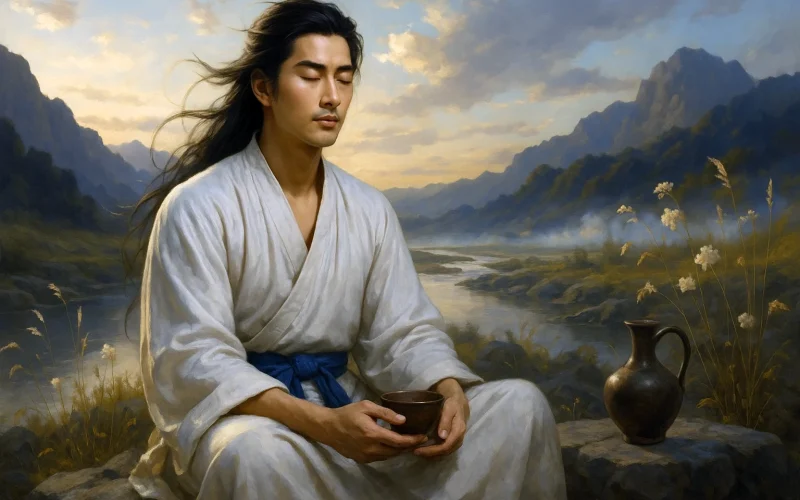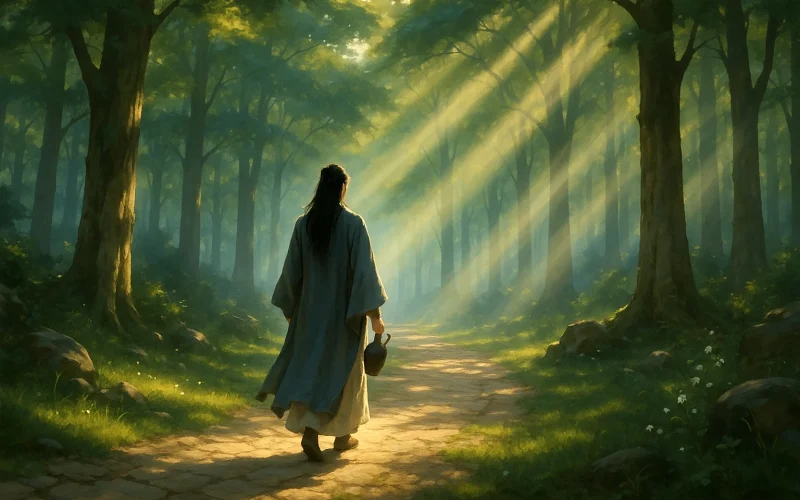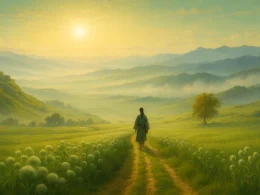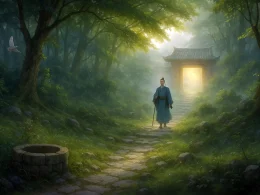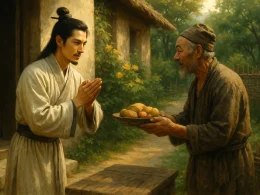The sky and earth will last forever;
Streams flow and mountains spread as ever.
As a rule, drooping plants may renew,
Withered by frost and revived by dew.
If man is the wisest of all,
Can he not know who rise will fall?
A man whom we have seen before
May die at once and is no more.
But who will take note of his death for long?
Even his kins have no memory strong.
Only the things he left before their eyes
May draw from them sad tears and drear sighs.
To be immortal I don’t know the art,
Nor do I doubt of my allotted part.
I wish you would remember what I say
And drink our cup of wine without delay.
Original Poem
「形影神 · 其一 形赠影」
陶渊明
天地长不没,山川无改时。
草木得常理,霜露荣悴之。
谓人最灵智,独复不如兹。
适见在世中,奄去靡归期。
奚觉无一人,亲识岂相思?
但余平生物,举目情凄洏。
我无腾化术,必尔不复疑。
愿君取吾言,得酒莫苟辞!
Interpretation
Written when Tao Yuanming was 41 years old, this poem captures a moment of profound This poem was written around 413 AD, when Tao Yuanming was 49 years old. Having resigned from official life and lived in seclusion for many years, his days were tranquil yet his thoughts profound. Faced with the impermanence of life and the fleeting nature of human existence, the poet began to contemplate the philosophical question of the "relationship between body and soul." Deeply influenced by Taoist thought and keenly aware of the social realities during the transition from the Jin to the Song dynasties, Tao Yuanming used a dialogue between "body" and "shadow" to explore profound ideas, creating an imaginative philosophical landscape. This poem is part of a triptych titled Body, Shadow, and Spirit, embodying his understanding of life, existence, and transcendence.
First Couplet: "天地长不没,山川无改时。"
Tiāndì cháng bù mò, shānchuān wú gǎi shí.
Heaven and earth endure without end; mountains and rivers never change their form.
The poet begins with the constancy of nature, highlighting the eternity of the cosmos, setting the stage for reflections on the brevity of human life.
Second Couplet: "草木得常理,霜露荣悴之。"
Cǎomù dé cháng lǐ, shuānglù róng cuì zhī.
Plants follow nature's law, flourishing and withering with frost and dew.
The cycle of plants serves as a metaphor for life's impermanence, illustrating the inevitability of natural law.
Third Couplet: "谓人最灵智,独复不如兹。"
Wèi rén zuì líng zhì, dú fù bù rú zī.
They say man is the wisest of beings, yet fails to match this natural order.
A challenge to humanity's claim of intelligence - unable to accept life and death as naturally as plants do, prompting philosophical reflection.
Fourth Couplet: "适见在世中,奄去靡归期。"
Shì jiàn zài shì zhōng, yǎn qù mǐ guī qī.
Just now we met in this world - suddenly gone, never to return.
A depiction of life's fleeting nature, emphasizing the unpredictability of death and evoking sorrow.
Fifth Couplet: "奚觉无一人,亲识岂相思?"
Xī jué wú yī rén, qīn shí qǐ xiāng sī?
Does no one notice? Do loved ones not remember?
Expresses the insignificance of individual life and the loneliness of being forgotten.
Sixth Couplet: "但余平生物,举目情凄洏。"
Dàn yú píngshēng wù, jǔ mù qíng qī ér.
Only the belongings remain; gazing at them fills the heart with grief.
Objects left behind evoke longing, a lament for the departed and a reflection on mortality.
Seventh Couplet: "我无腾化术,必尔不复疑。"
Wǒ wú téng huà shù, bì ěr bù fù yí.
I lack the art of ascension - you (shadow) need not doubt my fate.
Acknowledges human limitations and the inevitability of death, blending resignation and acceptance.
Eighth Couplet: "愿君取吾言,得酒莫苟辞!"
Yuàn jūn qǔ wú yán, dé jiǔ mò gǒu cí!
Take my words to heart: when wine comes, do not refuse!
Ends with an exhortation to enjoy life, advocating spontaneity and harmony with nature - both carefree and transcendent.
Holistic Appreciation
The poem adopts a fable-like dialogue between "body" and "shadow" to explore life’s brevity against the backdrop of cosmic permanence. The "body" speaks plainly, underscoring human frailty before time, contrasting with the natural cycles of plants. Tao Yuanming moves beyond personal grief, constructing meaning through philosophy.
Lines like "Just now we met in this world—suddenly gone, never to return" capture life’s fragility, while "Take my words to heart: when wine comes, do not refuse!" reveals his ethos of embracing the present. The work balances clarity and depth, leaving readers both enlightened and moved.
Artistic Merits
The poem’s hallmark is its allegorical dialogue, making abstract concepts tangible. Simple language contrasts with profound themes, allowing readers to glimpse depth in plainness. Parallel structures (e.g., "Heaven and earth endure without end; mountains and rivers never change") enhance rhythm and solemnity.
Natural imagery—from plants to landscapes—reflects the poet’s worldview of harmony with nature. Wine, a recurring motif, symbolizes both cultural tradition and Tao’s philosophy, blending Taoist serenity with Confucian sentiment into a unique style.
Insights
The poem teaches us to release attachments, embrace nature, and cherish the present. Life, as fleeting as plants, returns to silence—why not drink deeply while we can? Tao’s advice is not hedonism but a call to authenticity amid impermanence.
For modern readers, his attitude—"Engage when possible; refine oneself when constrained"—remains relevant. In this world, his meditations on finitude and eternity offer timeless wisdom: rather than chasing permanence, seek inner peace and clarity.
Poem translator
Xu Yuanchong (许渊冲)
About the poet

Tao Yuanming(陶渊明), 365 – 427 CE, was a poet, literary figure, fu writer, and essayist active during the late Eastern Jin and early Liu Song dynasties. Born in Chaisang (near present-day Jiujiang, Jiangxi Province), he pioneered a new genre of pastoral-themed literature, expressing profound philosophical insights through simple language. His poetic style became an enduring aesthetic standard in classical Chinese poetry.





